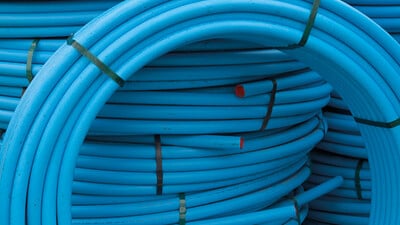corrosion and are flexible enough to withstand ground movement.
Installation
Can I install water supply pipes myself?
A competent DIYer may manage simple tasks such as connecting appliances to the water supply using flexible hoses. However, for extensive plumbing work, such as installing new supply lines, we advise you to hire a qualified plumber. Incorrect installation can lead to leaks, water damage and non-compliance with local building regulations.
What are the key regulations to follow during installation?
In the UK, water supply installations must comply with the Water Supply (Water Fittings) Regulations 1999. These regulations ensure that plumbing systems are safe and efficient while also preventing waste, misuse, undue consumption and contamination of water. It is important to ensure that all installations are carried out by professionals who understand and adhere to these regulations.
How do I determine the right pipe size for my water supply?
The correct pipe size depends on various factors, including the water pressure, the distance the water needs to travel and the number of fixtures that will be served. For a standard UK home, the mains supply pipe is usually 25mm in diameter, but this can vary. It's advisable to consult with a plumber or water engineer to determine the appropriate pipe size for your specific needs.
Do I need planning permission to install new water pipes?
While planning permission isn’t usually required for pipe installation, any major changes to water supply systems, especially in listed buildings or conservation areas, may need approval. Always check local building regulations.
Water Pressure and Flow Rate
What is the ideal water pressure for my home or business?
Water pressure in UK homes should typically be between 1.5 and 3 bar. If it’s too high, it can strain pipes; if it’s too low, fixtures like showers won’t work properly. Some commercial and industrial applications will require a system capable of higher pressure and volume.
How can I improve low water pressure?
Low water pressure can be due to blockages, leaks or undersized pipes. Installing a pressure booster pump or identifying and fixing any obstructions may improve the pressure.
What causes fluctuating water pressure?
Fluctuating pressure can result from shared mains lines, faulty pressure regulators or varying usage levels at peak times. An investigation by a plumber is usually needed to determine the cause.
Troubleshooting and Maintenance
What should I do if I suspect a leak in my water supply pipe?
If you suspect a leak, the first step is to check for visible signs of water damage, damp patches or a sudden drop in water pressure. If a leak is confirmed, it's important to shut off the water supply and contact a plumber immediately. Ignoring a leak can lead to significant water damage and costly repairs.
How can I prevent my water pipes from freezing?
To prevent pipes from freezing, especially during winter, consider the following steps:
Insulate the pipes
Use pipe insulation on exposed pipes, especially in unheated areas like lofts and basements (see ‘Pipe Insulation’).
Keep your heating on
Maintaining low-level heat in your property even when you're away will prevent the temperature from dropping too low.
Let your taps drip
Allowing a small trickle of water to run through the pipes can prevent them from freezing.
Seal any drafts
Ensure that any gaps or drafts near pipes are sealed to prevent cold air from causing them to freeze.
What are the signs that my water pipes need replacing?
Signs that your water pipes may need replacing include:
Discoloured water
Brown or rust-coloured water may indicate corrosion within the pipes.
Frequent leaks
Multiple leaks over a short period suggest that the pipes are deteriorating.
Low water pressure
A drop in water pressure could be due to blockages or corrosion within the pipes.
Visible corrosion
If you can see rust or corrosion on exposed pipes, it may be time to consider replacement (see ‘Replacement and Removal’).
How often should water supply pipes be inspected?
Water supply pipes should be inspected at least once a year, especially in older properties. Regular inspections can help identify potential issues such as leaks, corrosion or wear and tear before they become serious problems. For commercial and industrial properties, inspections may need to be more frequent depending on the usage and age of the system.
Can I repair a small leak myself?
Small leaks, such as those from a loose joint, can often be temporarily repaired using pipe repair tape or sealant. However, this is only a temporary fix, and it's important to have the issue professionally repaired as soon as possible to prevent further damage.
What is the best way to maintain my water supply pipes?
Regular maintenance can extend the life of your water supply pipes. Key maintenance tips include:
Regular inspections
As mentioned, annual inspections are crucial.
Water quality checks
Ensure your water is not overly acidic, as this can accelerate corrosion in metal pipes.
Pressure monitoring
High water pressure can strain pipes, leading to leaks. Use a pressure gauge to check that the pressure remains within a safe range (typically between 1.5 and 3 bar in the UK).
How can I reduce water waste in my plumbing system?
Installing water-efficient fixtures, using low-flow taps and maintaining pipes to prevent leaks are effective ways to reduce water waste. You can also check with your water supplier for any rebates or programmes promoting water efficiency.
How do I thaw frozen pipes safely?
Use a hairdryer or portable heater to gently warm the frozen section of the pipe. Never use an open flame. If the pipe has burst, shut off the water supply immediately and call a professional.
Pipe Insulation
Why is pipe insulation important?
Pipe insulation plays a crucial role in protecting your water supply system and improving its efficiency. Insulating your pipes offers several benefits, including:
Lower Energy Costs
Insulating hot water pipes reduces heat loss, which means your water heater doesn’t have to work as hard to maintain the desired temperature. This leads to lower energy consumption and reduced utility bills.
Preventing Pipe Freezing
In cold weather, uninsulated pipes are at risk of freezing, which can cause them to burst. Insulating pipes helps maintain a more consistent temperature, reducing the risk of freezing and subsequent water damage.
Condensation Control
Insulating cold water pipes prevents condensation, which can lead to moisture buildup, corrosion and mould growth in areas like basements and crawl spaces.
Increased Comfort
By maintaining the temperature of hot water pipes, insulation reduces the time it takes for hot water to reach your taps. This means less water wasted while waiting for it to heat up, improving comfort and convenience.
How does pipe insulation contribute to lower energy costs?
Insulating your hot water pipes minimises heat loss as water travels from the heater to your taps. By retaining more heat within the pipes, your water heater doesn’t need to work as hard or as often to reheat the water, leading to significant energy savings. This is particularly beneficial in large homes or buildings where hot water must travel long distances.
How does pipe insulation protect pipes during winter?
During winter, water in uninsulated pipes is more likely to freeze, especially in exposed or unheated areas such as lofts, garages or external walls. Frozen pipes can burst, leading to costly repairs and water damage. Insulating pipes helps maintain a more stable temperature, reducing the likelihood of freezing even in very cold weather.
What are the other benefits of pipe insulation?
Beyond energy savings and freeze prevention, pipe insulation offers additional benefits:
Noise Reduction
Insulated pipes can reduce the noise of water hammering or flowing through the pipes, making your home or building quieter.
Environmental Impact
By reducing energy consumption, pipe insulation contributes to lowering your carbon footprint, making your home or business more environmentally friendly.
Where should I add insulation to an existing water supply system?
To maximise the benefits of pipe insulation, focus on the following areas:
Hot Water Pipes
Insulate all accessible hot water pipes, especially those within three feet of the water heater, to minimise heat loss.
Cold Water Pipes in Unheated Areas
Insulate cold water pipes in unheated spaces such as attics, basements, garages and crawl spaces to prevent freezing and condensation.
Exposed Pipes
Any pipes exposed to outdoor air or located in external walls should be insulated to protect them from freezing temperatures.
Long Pipe Runs
How do I add pipe insulation to an existing system?
Adding insulation to an existing water supply system is a relatively straightforward process:
Choose the Right Insulation Material
Common options include foam pipe sleeves, fibreglass wraps and reflective insulation. Foam sleeves are popular for their ease of use and effectiveness.
Measure and Cut the Insulation
Measure the diameter and length of the pipes you wish to insulate. Cut the insulation to the appropriate length using a utility knife.
Install the Insulation
Open the pre-slit foam sleeve or wrap the fibreglass around the pipe, ensuring it fits snugly. Seal the seams with adhesive or insulation tape to prevent gaps.
Secure the Insulation
Use zip ties, duct tape or special insulation fasteners to secure the insulation in place, especially in areas where the insulation might shift or become loose.
Insulate all Elbows and Joints
For bends and joints, use special insulation covers designed for these areas, or cut and fit smaller pieces of insulation material to wrap around them.
Inspect and Maintain the Insulation Regularly
Regularly check the insulation for any signs of wear or damage, particularly after severe weather, and replace or repair as needed.
Can I insulate pipes myself, or should I hire a professional?
Insulating pipework is a task that many homeowners and property managers can do themselves, especially in inaccessible areas such as basements and attics. However, if the pipes are hard to reach or located in complex or confined spaces, it might be worth hiring a professional to ensure the job is done safely and effectively. A professional can also provide advice on the best insulation materials for your specific needs and local climate.
Replacement and Removal
When should I consider replacing my entire plumbing system?
If your plumbing system is more than 50 years old, or if you are experiencing frequent leaks and water quality issues, it may be more cost-effective to replace the entire system rather than continuing to repair individual pipes. A full system replacement can also ensure that your plumbing meets modern standards and regulations.
What is involved in the removal of old water supply pipes?
To remove old water supply pipes you need to shut off the water supply, cut away the old pipes and carefully remove them from the building. The water supply should be capped off or a new system should be installed before the supply is reinstated.
This should be done by a professional to ensure that it is done safely and to avoid damaging other parts of the plumbing system. If the pipes are made of lead, special precautions must be taken to handle and dispose of them safely.
Can old pipes be recycled?
Yes, many old pipes, particularly those made from copper and other metals, can be recycled. Recycled materials can often be reused in new plumbing systems or other applications. However, it is essential to ensure that old pipes are disposed of or recycled following local environmental regulations.
How much does it cost to replace water supply pipes?
The cost varies depending on the material, length of pipe, accessibility and labour rates. For a small home, replacing the main water supply line may cost between £500 and £1,500, while larger properties and more complex jobs could be considerably more.
What is the cost difference between copper and plastic pipes?
Copper pipes are generally more expensive in terms of both material and installation. PEX or CPVC pipes are more cost-effective and easier to install, reducing labour costs.
Innovations and New Technology in Water Supply Systems
What are smart water meters, and should I install one?
Smart water meters monitor water usage in real time, helping you detect leaks early and manage water consumption more efficiently. They can provide more accurate billing and identify unusual patterns in water use. Installing a smart water meter can be a good investment for households and businesses looking to reduce water waste and improve efficiency.
Are there new technologies for preventing leaks?
Leak detection systems are increasingly popular, as they automatically shut off the water supply when they detect an abnormal flow rate. This can prevent extensive damage in the event of a leak.
How can I future-proof my water supply system?
Choosing durable materials, ensuring your pipes are properly insulated and installing smart water management systems can help future-proof your plumbing and reduce long-term maintenance costs.
What are the implications of climate change for water supply pipes?
With more extreme weather conditions, pipes are more at risk of freezing or bursting in cold snaps, while water shortages may become more common during heatwaves. Upgrading your system with freeze-resistant materials and installing water-saving fixtures such as rainwater harvesting can mitigate some of these risks.
Property-Specific Concerns
What should I do about water pipes in an old or listed building?
In listed or historic buildings, you must be cautious with alterations to water pipes. Some old buildings still have lead pipes, which should be replaced, but permission may be required for major changes.
Are there any safety risks with older plumbing systems?
Older systems may contain lead pipes or deteriorating materials that could lead to contaminated water. Additionally, corroded or damaged pipes pose a risk of leaks, flooding, or even burst pipes in cold weather.
How can I check if my drinking water is safe?
The quality of drinking water can be checked by using home water testing kits or contacting your local water supplier for testing services. Lead pipes, in particular, pose a health risk and should be replaced.
Are there special considerations for water supply in commercial or industrial buildings?
Commercial and industrial properties often require higher-capacity plumbing systems and may need more durable materials such as stainless steel. Backflow prevention devices may also be a legal requirement for these types of properties to prevent contamination.
We hope you have found this information interesting and helpful. If you have any further questions you are always welcome to call our friendly team of experts on 01420 555600 or email [email protected].
Also, look out for more articles in our ongoing series of blog posts, bringing you useful information, insights, guides and tips on all things drainage!

Written by
Bob Stone
Technical Sales
Heading up our Technical Estimating Department, Bob is our in-house quantity surveyor.

